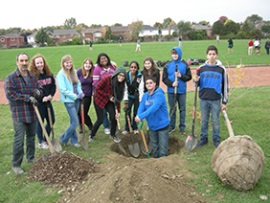
by Brianna Crandall — April 17, 2015—Dunbarton High School of Pickering, Ontario, Canada, was announced on April 15 as the 2015 Greenest School on Earth by the Global Coalition for Green Schools, an initiative of the Center for Green Schools at the U.S. Green Building Council (USGBC), provider of the LEED sustainability program.
The Greenest School on Earth is an annual competition, highlighting a Kindergarten to 12th grade (K-12) school that exemplifies how sustainability can be integrally woven into the infrastructure, culture and curriculum of a school.
The Center defines a green school as one that achieves zero environmental impact (including energy, water, waste and carbon), a positive impact on occupant health and performance, and 100 percent environmentally literate graduates. These traits are encompassed in three pillars: environmental impact, human health and ecoliteracy. The Greenest School on Earth designation includes a $1,000 award to be used by the selected school for a sustainability initiative.
“The Greenest School on Earth recognition goes to the school that is defining what it means to live, breathe and teach whole-school sustainability,” said Rachel Gutter, director of the Center for Green Schools. “Dunbarton High School is an excellent example of a school that engages its students at every turn, placing them in the driver’s seat and empowering them to improve their environment, inside and out. We are pleased to recognize Dunbarton’s efforts to improve their community, enhance the biodiversity of the region, and elevate young minds to a higher order of thinking about sustainable practices.”
Dunbarton High School, built in the 1960s, has undergone a significant retrofit over the past five years, installing new energy-efficient windows, insulation and lower wattage lighting. The school offers a Specialist High Skills Major in Environment and engages students through coursework and extracurricular activities related to the school’s natural surroundings.
Also a winner of the 2014 Greenest School in Canada (link to school case study) competition through the Canada Green Building Council (CaGBC), Dunbarton features an outdoor classroom for 40, a 500 square meter pollinator garden, and a rooftop solar water heater. Students at the school are provided with stainless steel water bottles upon matriculation and are involved in projects such as organic waste removal and the Atlantic salmon restoration program. The school plans to utilize the $1,000 award to develop a school garden and construct 10 additional bee condominiums, to be shared with the local community.
A USGBC video and Global News video about the award are available online.





